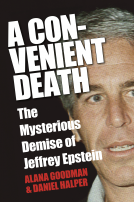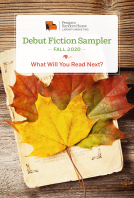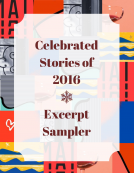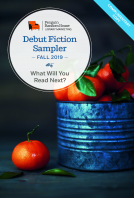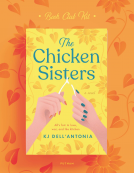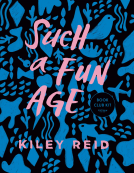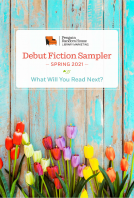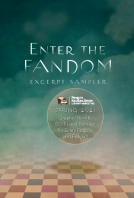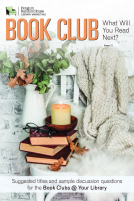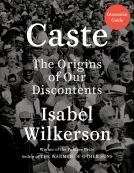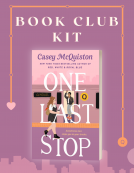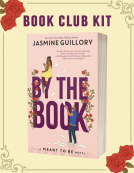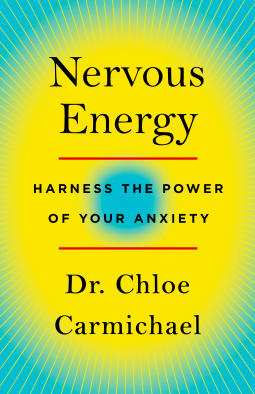
Nervous Energy
Harness the Power of Your Anxiety
by Chloe Carmichael
This title was previously available on NetGalley and is now archived.
Send NetGalley books directly to your Kindle or Kindle app
1
To read on a Kindle or Kindle app, please add kindle@netgalley.com as an approved email address to receive files in your Amazon account. Click here for step-by-step instructions.
2
Also find your Kindle email address within your Amazon account, and enter it here.
Pub Date Mar 23 2021 | Archive Date Mar 26 2021
St. Martin's Press | St. Martin's Essentials
Talking about this book? Use #NervousEnergy #NetGalley. More hashtag tips!
Description
“Anxiety and stress are the number one epidemic of modern civilization. Frequently, stressed people find themselves at the pinnacle of success at the cost of unhappy lives, fractured relationships, and unhealthy bodies.... This book offers the tools they need." —Dr. Deepak Chopra, MD, New York Times bestselling author of The Seven Spiritual Laws of Success
Learn how to overcome anxiety by transforming it from an obstacle into an advantage.
Nervous energy is something many of us are familiar with—it’s the urge to double check our work, to create a tidy strategy for an overwhelming goal, or make a to-do list and tick every box neatly. But when work and life become more complex and unpredictable, when there isn’t a straightforward to-do list or clear step by step solution, this nervous energy can spiral into anxiety and stress, becoming a roadblock to success.
Instead of merely trying to overcome anxiety, Dr. Chloe Carmichael uses a combination of storytelling and step-by-step directions to share nine powerful tools thato help you harness this energy in a productive way. Based on her years of experience helping patients change their anxiety from a setback into an advantage,
Nervous Energy offers:
- A breakdown of three common nervous energy profiles
- Step-by-step directions for implementing each of the nine tools in your life
- Exercises, charts, and worksheets
- Real-life stories and examples of people overcoming anxiety with these tools
A must read for anyone feeling trapped by stress and anxiety, Nervous Energy is a practical guide to transforming anxiety and nervous energy into a powerful positive force.
Advance Praise
“Anxiety and stress are the number one epidemic of modern civilization. Frequently, stressed people find themselves at the pinnacle of success at the cost of unhappy lives, fractured relationships, and unhealthy bodies. Their energy is wasted even though they may have an excess of it. If 'high energy' people learnt to harness their energy to go beyond reactive responses to modes of intuition, creativity, and emotional resilience, they would achieve even more by doing less and be happier and healthier. This book offers the tools they need."
—Dr. Deepak Chopra, MD
"Dr. Chloe delivers countless concrete suggestions for people who want fast and simple tools to destress, manage emotions, and increase productivity. This book and its advice will absolutely change your life for the better!"
—Dave Kerpen, New York Times bestselling author of The Art of People
"Nervous Energy is a wonderful book. Dr. Chloe has an incredibly warm and engaging style that makes complex concepts feel simple and immediately useful. Vivid stories about how she has used the techniques in her own life both personally and professionally add a layer of vulnerability that makes the book come alive. This is a very helpful book and a must read!"
—Daniel G. Amen, MD, Founder, Amen Clinics, and New York Times bestselling author of Your Brain Is Always Listening
"Nervous Energy is for the millions of Americans who consider themselves stressed, overwhelmed, or socially anxious. Through clear, engaging storytelling supported by practical advice, Dr. Chloe takes readers on an inspiring journey and helps them implement her science-based solutions into their lives."
—Dr. Mike Dow, New York Times bestselling author of The Brain Fog Fix
Available Editions
| EDITION | Other Format |
| ISBN | 9781250241214 |
| PRICE | $26.99 (USD) |
| PAGES | 224 |
Average rating from 53 members
Featured Reviews
I personally suffer from anxiety and a lot of people do especially during these times. This book is a very constructive way to address those issues with new and out-of-the-box methods. I highly recommend this book.
 Erin C, Reviewer
Erin C, Reviewer
Special thanks to NetGalley and the publisher for a free, electronic ARC of this novel received in exchange for an honest review.
Expected publication date: March 23, 2021
A “high functioning” person, according to Dr. Chloe Carmichael, is “someone who goes beyond the basics of taking care of their physical and mental self, is able to take care of their basic needs and can sustain meaningful relationships with friends and family”. Furthermore, a “highly functioning person” is usually an overachieving Type –A personality, who is driven to succeed, has personal and occupational goals, and strives to perform well. It is to these people that she targets in her novel, “Nervous Energy: Harness the Power of your Anxiety”. Carmichael believes that these types of people benefit from anxiety, and that oftentimes their anxiety has led them to multiple paths of success, but they can also suffer detrimentally from this same anxiety, and she aims to explore this.
I have read a few self-help books (I try to avoid them for the most part, as I find them oftentimes to be preachy and condescending), but the ones I do read focus on anxiety and depression. To use Carmichael’s phrasing, I am a “consumer” of therapy, and have had a few therapists (Carmichael explains that high functioning people find it difficult to match with a therapist because they have more complex needs) , so I am too familiar with Cognitive Behaviour Therapy, and have probably tried each and every therapeutic activity for anxiety that there is. It is hard for me to read a book on anxiety and be totally blown away by the author’s new and novel therapeutic suggestions (I am also a skeptic, so it takes a lot to get me to “buy in” to a lot of therapy techniques….did I mention I have a BA in psychology?) but Carmichael provided a few more techniques that I hadn’t tried before, and I might even be willing to give them a shot.
Carmichael highlights her nine-step approach through examples from her client base (honestly, one of them was so relatable I worried Carmichael had somehow been spying on me), and then breaks them down to make them relevant and usable to just about anyone who suffers from anxiety (and, of course, is “highly functioning”). Unlike most therapy approaches that suggest a person with a Type-A, “almost OCD” personality alter their ways of thinking and behaviour, Carmichael highlights the positives of these personality types, and instead targets the negative thought patterns that these types may suffer from. It was refreshing to see this type of attitude portrayed in a self-help novel.
Some of these approaches are new (to me) and some seem to be just more detailed examples of things I’ve seen before, but either way, Carmichael definitely has a creative way of addressing the “anxiety-driven person”. Although Carmichael touts the benefits of therapy (and encourages her readers over and over again to ‘review’ the activities and tools with a trusted therapist), but her suggestions are also good starting points for those who aren’t quite ready to make that jump.
“Nervous Energy” has good flow, uses easy-to-understand language, and actually provides a bit of insight and new therapeutic techniques, which is great for anyone who is tired of trying the same therapeutic activities over and over and having no success.
 Beth C, Librarian
Beth C, Librarian
An engaging and clearly written title about how to harness and take advantage of nervous energy that can be stressful and damaging in one's life or helpful.
This review starts with my review of the book, and then some feedback for the publisher:
I shared some of the advice in this book with coworkers at an event about expectations during the pandemic, and it was a huge hit.
I felt this book got a lot right, and I love the use of bold font for the important points. This book actually covers a lot of topics, many of which have whole books devoted to them. The intro makes it seem like the book is for people who struggle to plan or handle open-ended problems, but in fact it's for people who tend to over-correct. Though not every statement will apply to you, there were enough that I felt, "yes, that is me". The situation that most spoke to me was the story of a person who kept waffling between two strategies for dating, trying to find the right balance between being flexible and open and being firm in her desires and values. I identified with this rush to find the right strategy from the get go and worrying more about whether someone likes me than whether I like them.
I've read a lot of self-help books and engaged in different behavioral therapies, and was surprised to find some new techniques here. Techniques that weren't new to me did happen to be techniques and ideas that helped me in the past, such as metacognition, perfectionism and cognitive re-framing. Chapter 5 deals with perfectionism and provides suggestions that are reminiscent of self-compassion - don't skip it!
I like that the author presents the book and techniques more as a reference from which you choose what works best for you in that moment. In chapter 3, she introduces a menu of techniques that she provides to her clients, and in chapter 4, she provides three example people and which techniques they might select.
The three example people and their recommended technique "starting points" were useful to help me think through which techniques to apply. None of the people were a perfect fit. Reading the examples, I was able to see which techniques were a fit and why and say yes, that makes sense for me, or no, that isn't my issue. For example, mind maps, I love mind maps and use them all the time because they just fit the way I already think.
My personality is more of the endless planner, always looking to increase efficiency, making this faster and more effective, getting to the essence of the problem and continuously improving. I make a good plan and I love planning and organizing and strategizing whether it's studying a language, playing a game, or completing a project. However, I am always second-guessing my plan, and I haven't gotten used to waiting years for fruition. One could brush that off as being a millennial, but women and minorities often are criticized for not having results or their results not being enough. So, I've absorbed that criticism over time.
I started with the zone of control, the mental short-list, the to-do list with emotions, and worry time. I've created a worry-agenda before (really a parking lot of negative thoughts to make myself not get distracted at work), and I can tell you it is fabulous. However, I'd never made worry time before. The to do list with emotions is also very helpful for thinking through procrastination or breaking up a task, but I can also see it feeding endless revisions of plans.
My only criticisms are that there is maybe a little too much personal exposition and I didn't like the use of generalizations, especially in the first two chapters. However, this type of book is more about the demonstrations and the techniques. It is also very very easy to navigate to skim or skip sections or anecdotes.
Formatting:
-Some of the tables didn't stay as tables in flowing text. I liked that it wasn't a table because it's easier to read, but it took some effort mentally to parse the columns.
-There is also a dr-chloe.com which is a first result in google searches. It may be worth changing the domain name or getting a pointer for the link in the book.
-I couldn't find the worksheets referenced in the book.
Organization:
-Some topics were in odd locations. For example, the advice on finding a therapist was in the to do list of emotions. The advice didn't seem unique to the tool and maybe warrants its own chapter.
Comments on the tools:
-I think the emotional to do list really is the most nuanced and tricky, but when I shared the concept with coworkers they were in love and wanted this book right away. The anecdote about the woman dating and making a list of things she didn't like or liked was very helpful to me.
-For the mental shortlist, I love this idea but as an over-committer it is easy for me to make a list of things that will get me overexcited. For example, checking Twitter or working on politics. What if I pick something that is too distracting or too much of a rabbit hole? Or I indulge a bad shopping habit?
-Worry time: I used to keep a worry agenda. I called it a parking lot of ideas. When I was trying to do deep work, I kept a pad of paper next to me and when a little negative self talk or worry or distracting idea popped up, I wrote it on the list/put it in the parking lot. To me, instead of "worry", this agenda could be just any mental distraction.
-I think the thought replacements instructions need more examples. I am familiar with cognitive reframes/distortions and perhaps presenting the different types would help.
If you are a type "A" person, a perfectionist, or someone in a leadership position who experiences anxiety, then Nervous Energy by Dr. Chloe Carmichael might a good fit book for you. As a type "A" person myself, I found many of the anecdotes and the methods for calming my anxiety to be novel, yet attainable. I even found myself taking notes, so I could remember and practice some of technique that are shared by Dr. Carmichael. (I shared a few tips with my educator colleague and both agreed they were great methods for dealing with stress). We often don't realize that someone who is high functioning can feel deep anxiety. Some of the focused material delved on managing your breathing, narrowing your "Zone of Control," and looking at patterns that can cause hiccups in your daily life routines. I think the addition of graphics or small images to illustrate the methods would enhance the material even more. Overall, I enjoyed this selection and would definitely recommend to others.
 Kate C, Reviewer
Kate C, Reviewer
This read is a great marriage between cognitive ideas and mindfulness techniques. The how-tos are accessible to those new to meditation and breathing but also detailed enough that a seasoned yogi or meditator can gain value.
 Reviewer 562731
Reviewer 562731
This is a great guide for so many in this age of anxiety. I love the approach Carmichael has outlined and feel like this could be beneficial to those who struggle with their anxiety, as well as those who are "high-functioning" but still know their anxiety is holding them back ,
Many thanks to St. Martin's Essentials and NetGalley for the advance copy.
Thank you NetGalley and the publisher for an advanced e-copy of Nervous Energy by Chloe Carmichael!!!
This is a good read for someone that has high functioning anxiety. Lots of tips and ways to try and help deal with it. A good read for anyone with or without anxiety.
I am a very nervous and anxious person so having Dr. Carmichael create a guide during these tumultuous times was incredibly helpful. It was a bit slow and dry to read through but the information is very helpful. Great tips on how to harness your energy into something productive rather than destructive.
Overall, I really like this book. Dr. Carmichael is a New York City based therapist who specializes in “high functioning people”. This is actually my only real complaint about the book. Low functioning people she defines as people who struggle to meet their most basic needs (food, shelter, employment), who have mental health diagnoses that prevent them from doing these things, or who have big social challenges. High functioning people, on the other hand, are people who are successfully employed, were successful in school, pay their bills and have some savings, have satisfying relationships, and so forth. She says that while lower functioning people need weekly therapy to learn skills and be in the presence of a higher functioning person, higher functioning people may not need weekly therapy and tend to need more goal-oriented and practical approaches. Maybe I don’t really think this designation is necessary because I do work with more high functioning clients and not at an inpatient or county mental health facility? But I feel like most of us therapists (in fee for service private practice anyway) are seeing higher functioning clients, and it’s such a huge category that I think making any really large sweeping statements about the whole group is insufficient. But be that as it may, this book is for “high functioning” clients who need practical tools for their particular issues.
While anxiety is typically categorized as “bad”, Carmichael explains that some level of healthy anxiety – or “nervous energy” – is what makes a lot of high functioning clients successful. And while this energy/anxiety is great to get through school or be successful at a high paced job, sometimes it is not helpful in their personal lives or inside their heads. So she gives 9 tools that she has found helpful in teaching high functioning or driven clients to cope with excess anxiety or energy. Many of these tools are common mindfulness or CBT tools that many therapists use, with both high and low functioning clients. There were a few things I found here that I thought were new, but most of the information can be found elsewhere. Still, I did really like the organized way that she laid out the information and the examples and step-by-step instructions that she portrayed.
The 9 tools are: 1) a three part breath (a mindfulness technique that is grounding); 2) Zone of Control (making lists of what you can and can’t control); 3) Mental shortlist (a list of things you’d rather be thinking about besides the thing you are ruminating about); 4) a To-Do List with Emotions (adding emotions can help clarify why you’re having trouble getting your to-do list done); 5) Mind Mapping (a visual map of all the thoughts and feelings you have about a certain issue); 6) Worry Time (scheduling worry time so you don’t worry all the time!); 7) Response Prevention (finding alternatives to a behavior you want to stop doing); 8) Thought Replacement (finding a replacement thought for a problematic one); and 9) Anchoring Statements (simple statements to ground you when you are panicky).
I have used almost all of these techniques with clients, but I like the idea of keeping this menu “handy” with certain clients so that I can more easily remember them and decide when they are appropriate. I also think that a lot of clients would really like this book, as it explains very simply and clearly how to do each technique and when/why you would. I’ll definitely buy a copy for my shelves!
 Dee Dee (or DeeDee673 M, Reviewer
Dee Dee (or DeeDee673 M, Reviewer
Interesting subject matter and very long slow read unless you are one of the people described or have a particular interest in counseling. The techniques descibed for alleviating stress would be beneficial primarily to those types of persons. I think I am quite "burned out" on the topic of mindfulness in general.
I was provided an advanced reader copy of the book and was under no obligation to provide a review. The opinions expressed are my own. Thanks to the author,publisher and NetGalley for allowing me to read this book.
 Katie O, Reviewer
Katie O, Reviewer
This is a must read for high achievers. This book helps you level up by better controlling your emotions. And for those high achievers like myself who struggles with always needing achievement, fear of failure, etc. - there is a whole toolbox of tools to leverage to help you cope and excel.
 Louise F, Reviewer
Louise F, Reviewer
Smart, lively, and thoroughly entertaining, Chloe Carmichael's NERVOUS ENERGY delivered far more than my high expectations. With fact, stories, and hard-won experience, Carmichael encourages those of us who are powerfully driven to achieve to channel our talents, ambitions, and dreams with motivating, clear insights and simple, potent techniques. Her frank discussions and explanations of how and when to apply the tools propelled me to hurtle through this read and put it into immediate application. Perhaps my favorite aspect of NERVOUS ENERGY is the consistent emphasis that the tools are ours to use as makes sense to us, modifying and shifting our work with changes in our lives. I received an advance reader copy of this title from NetGalley and the publisher in exchange for my unbiased review.
I’ve been in therapy for PTSD and general anxiety disorder for most of my life. I expected that this book would be a lot of the same techniques and visualizations that I’ve always heard. I was surprised to find that it was very useful and had some really helpful tips and tricks for turning my anxiety into a positive. I will definitely recommend it.
This is the first I guess you could say “self help” book I have read in a long time! I got it because I thought it was about anxiety! Though it was more for “high functioning” personalities I did find some of the techniques insightful!
I related to parts of the book but at times felt the explanations of patients was drawn out and would love more examples on the techniques! This was something I find myself needing more so after 2020 so overall a very helpful book!
 Nancy F, Reviewer
Nancy F, Reviewer
Managing Anxiety for High Functioning People
A person driven to succeed, tries to do everything right, wants to be in charge and has lots of nervous energy. This is the person Dr. Chloe Carmichael’s book is intended for. However, even if you don’t qualify as a super Type A personality some of Dr. Carmichael’s treatment suggestions can be valuable.
Although high energy people who are very successful can appear to have it all under control, they can also suffer from sever anxiety. I thought the author did a good job of illustrating this type of person in the examples she chose. Whether you find yourself in those people, it will give a better understanding of this personality type.
I thought the best part of the book was the treatments described by Dr. Carmichael. She doesn’t focus on just one approach but goes into several treatments. One chapter is devoted to a laundry list of approaches for dealing with OCD type problems. With so many tools, not all will be appropriate for each situation. The author encourages you to look at the spectrum and decide what might work for you.
This is a helpful book for anyone suffering from nervous energy that threatens to control their life leading to OCD like behaviors. The book is very readable and the client descriptions are well done.
I received this book from St. Martin’s Press for this review.
 Kathi P, Reviewer
Kathi P, Reviewer
Y'all, if you have somewhat OCD tendencies and are looking for a way to turn that anxious energy into something more productive, I recommend you read Dr. Chloe Carmichael's new book, NERVOUS ENERGY. She provides 9 tools for managing excess energy that are very helpful! #NervousEnergy
Why not use all that nervous, fidgety anxious energy for good?
 Educator 702553
Educator 702553
Nervous Energy by Dr. Chloe Carmichael is a book that provides guidance on dealing with nervous energy in a way that helps you move through it effectively. The book shares a variety of mental techniques related to time-management, reducing stress, and developing boundaries. This book hopes to help those that deal with anxiety, panic attacks, OCD, and other disorders to make daily life manageable. The author draws upon techniques from cognitive-behavioral therapy, mindfulness, yoga, and techniques she has developed herself for a holistic framework.
I found this book well-written that is able to communicate effectively with people without dumbing things down that it loses its meaning. Through this book I realized I am a bit of a "scrutinizer" and I found the specific techniques of three pint breath, zone of control, worry time, and mind mapping helpful after reading this book. I also appreciated the anecdotes with clients that helped support the information throughout the book. Specifically, I liked the author's anecdote on how she used this as a graduate student since I can apply this to my own career as an academic. I found it interesting how the author highlighted the benefits of structure since I found in my own experience that helps me manage my overwhelm. Overall I highly recommend this book for those who find themselves to naturally run more anxious or for anyone looking for some acute help when dealing with random anxiety.
Many thanks to the publisher St. Martin's Press and Netgalley for the ARC in return for an honest review.
"Nervous Energy" was a good, shorter read. The book is focused on people who have high anxiety/nervous energy levels who need a few coping skills to help them step back from perfectionist tendencies that keep them highly strung. Dr. Carmichael elaborates on nine tools that can be helpful for these cases. For instance, the very first skill that is discussed is a breathing technique that can be used as a base-level calming down skill. The book is written very thoroughly, with each chapter detailing a human example, how to do the technique, and how to troubleshoot it if you don't find it is working for you. It is a great read if you are looking for a little help on how to put away intrusive thoughts, react in situations better, etc.
Thanks to Netgalley and St. Martin's Press for the e-ARC in exchange for an honest review.
I am reading this book as a reviewer and at first when I read the introduction, I was not sure I was the target audience based on the description of who has nervous energy. But as I started reading I realized this book is applicable to everyone! In fact, the author says the techniques in this book are geared toward people who recognize there is something about their own thought patterns or skills they'd like to change or improve. What I really loved about the book, is that Dr. Carmichael shares a variety of techniques that are practical, easy to learn and do on my own, and are extremely effective. The book is very well structured - it starts with a story as an illustrative example, then an overview of a tool and technique used to help, and then more tips on how to use the tool- "DIY" as she calls it. Part II goes into a deeper dive on each tool/technique. I have highlighted many pages in this book so that I can use the appropriate technique when I am either feeling anxious or overthinking something. I started using two tools immediately - "The Three Part Breath" - which helps me reconnect with myself and calm my thoughts and nervous system, and "Zone of Control" - great to use when I am overwhelmed with worry because it helps me focus on things I can control vs. things I cannot control and define actions for those things I can control.
I highly recommend this book particularly during this time of the pandemic where everyone is feeling high levels of anxiety.
 Reviewer 721193
Reviewer 721193
Nervous Energy by Cloe Carmichael is a book that talks about tools and techniques to handle anxiety. After reading this I realized that I am high functioning. I look forward to using some of the techniques mentioned in this book.
Thank you, NetGalley for giving me the opportunity to read Nervous Energy by Chloe Carmichael.
 Jeremy R, Reviewer
Jeremy R, Reviewer
"Nervous Energy" will be a beneficial book for many people. Dr. Carmichael sets out the material she presents in a clear understandable manner. One thing I liked about the book is that Dr. Carmichael explains how she utilized some of the techniques to assist her in her own life and in her clinical practice. When discussing each technique, she uses a real client as an example (with names changed), explaining what the client was struggling with, why this particular technique was useful in this situation, and specifics as to how the technique was utilized. Dr. Carmichael also includes troubleshooting tips for each technique, addressing common concerns about or struggles with the technique that clients have raised. Another positive about this book is that Dr. Carmichael does not insist that any particular technique is the "right" one for particular people or situations or that her approach is the "correct" one. Rather, she encourages people to try out the techniques that seem the best fit for them and she encourages people to seek therapy or utilize other resources if appropriate for their situation.
I received a copy of the e-book via NetGalley in exchange for a review.
This book really hits home for a “Capital A Type A” like me, particularly in an 18 month period that’s held this much change personally (caring for ill, aging parents; heartbreak), professionally (a promotion and managing a much larger team) and globally (pandemic, racial injustice). From the intro’s “suddenly there’s more work to do than any human being could possibly double-check, there’s no syllabus or clear objectives, and there’s a team of people whose approval you’re seeking rather than just one person,” Dr. Carmichael captures the sense of languishing overwhelm I’m feeling. Though at times the author’s examples from working with exclusively highly privileged, highly functioning people in NYC can seem aloof and off-putting, the practical tips like the Three-Part Breath, speaking to yourself the way you would a good friend who asked for candid feedback, and the “To-Do List with Emotions” — since many ‘overachievers’ like me are used to accomplishing a ton and ‘powering through’ by putting emotion aside— could be useful for anyone who’s looking to harness their nervous energy and remember that (particularly in moments that need an anchoring statement), “My number one job right now is to breathe.” Here’s to continuing to grow in ways that enable us to take control of our nervous energy rather than letting it take control of us.
This is a well-researched book with a fascinating premise, and it's a valuable addition to the self-help field.
So often anxiety is seen as an incredible burden, and it is. But this book turns something that many people with anxiety can't turn off into something useful. It turns something that can feel absolutely awful into something helpful. More, the detailed worksheets the author, Chloe Carmichael, makes available on her website are also quite useful.
Chloe Carmichael does a great job at not bogging down the the book with overly esoteric language, and at keeping her examples fresh and relatable. The techniques discussed are also practical and easy to apply, and definitely gives hope to people suffering from anxiety, like me, that we don't have to fight to eliminate it (which is impossible) but can actually use our anxiety to make our lives better. Well done!
Our nervous energy can lead us down a path of self-criticism, anxiety and pessimism. This book offers nine tools to help you harness your nervous energy and be able to live a more productive and fulfilling life. Great tips! Thank you to NetGalley and the publisher for an ARC.
The most successful among us might seem effortlessly put together, but a tendency to over-think and over-analyze can hold them back. Drawing on research evidence, CBT best practices, and her own experiences as a therapist, Dr. Carmichael offers strategies for high-functioning individuals on how to successfully manage the worst of their thinking patterns.
 Reviewer 542599
Reviewer 542599
Nervous Energy gives readers several tools to use to help manage anxiety. I found the 9 techniques outlined to be very helpful. The "Zone of Control" technique helps to focus what can be controlled and I can see using that tool in the future. The real life examples in the book are very helpful in relating back to something we might be dealing with ourselves. I would recommend this book to anyone looking to manage their high functioning anxiety.
 Reviewer 783636
Reviewer 783636
It was a long time i read this book but I’m not the usual person to share my review, This book even short was very refreshing and was able to point down 2,3 points of it, I wish to have the physical copy and reread
“Amy felt stuck—and the worst part was, she was keenly aware that she was actually the person holding herself back. Her ‘nervous energy,’ which had once been a friend that provided an excited drive to be ‘on point,’ was now becoming a ‘rabbit hole’ of excessive self-criticism, anxiety, pessimism, or analysis paralysis.”
Nervous energy (often the result of being a go-getter with a high personal drive) was once was an asset to many high functioning people and has become a hinderance. Dr. Carmichael shares the nine techniques she uses in her own practice that allow people to regain their edge: The Three-Part Breath, The Zone of Control, Mental Shortlist, To-Do List with Emotions, Mind Mapping, Worry Time, Response Prevention, Thought Replacement, and Anchoring Statements.
With each technique, the author shares a case study, tools to help with implementation, and troubleshooting considerations. Of the techniques, my favorites are the zone of control and mental short list. The author also shares some reasons for high-functioning people to consider seeking therapy and tips on determining whether the therapist is a good fit as well as personal stories, such as her own experiences in finding the right therapist.
While many of the techniques felt familiar from previous self-help books and the numerous psychology courses I’ve taken, I like how they are presented in this book. The book approaches dealing with one’s nervous energy in a positive, self-compassionate way. The case studies help show the normality of dealing with the issues that many successful people struggle with. The book is well-structured for easy implementation of the techniques.
I voluntarily read and reviewed an advanced copy of this book. All thoughts and opinions are my own.
Thanks to St. Martin’s Essentials, an imprint of St. Martin’s Publishing Group, for providing an Advance Reader Copy via NetGalley.
I have anxiety and I'm always looking for ways to harness that energy. This book is broken up into easy-to-digest chucks, structured around nine techniques. Most of these techniques are not new: for example, scheduling worry time, or breathwork. However I like the way these ideas are presented in a structured way that will appeal to those of us who are "a little OCD." My favorite part, and something I haven't seen in other books, are the lists of "basic functioning" and "high functioning" markers. I didn't realize I've been actually functioning at a very high level! As the author states, we Nervous Energy havers tend to be very hard on ourselves. So that was a big revelation for me. I would recommend this book for recovering perfectionists, but maybe check it out from the library before purchasing.
I loved this book. The author lays it straight for high-functioning adults like me. The exercises she includes aren't overly complex and they are really helpful. I have always had trouble with the breathing part of yoga, Carmichael breaks it down into a tangible way for me to practice breathing!
I have already recommended this to friends!
Readers who liked this book also liked:
We Are Bookish
General Fiction (Adult), Romance, Women's Fiction
